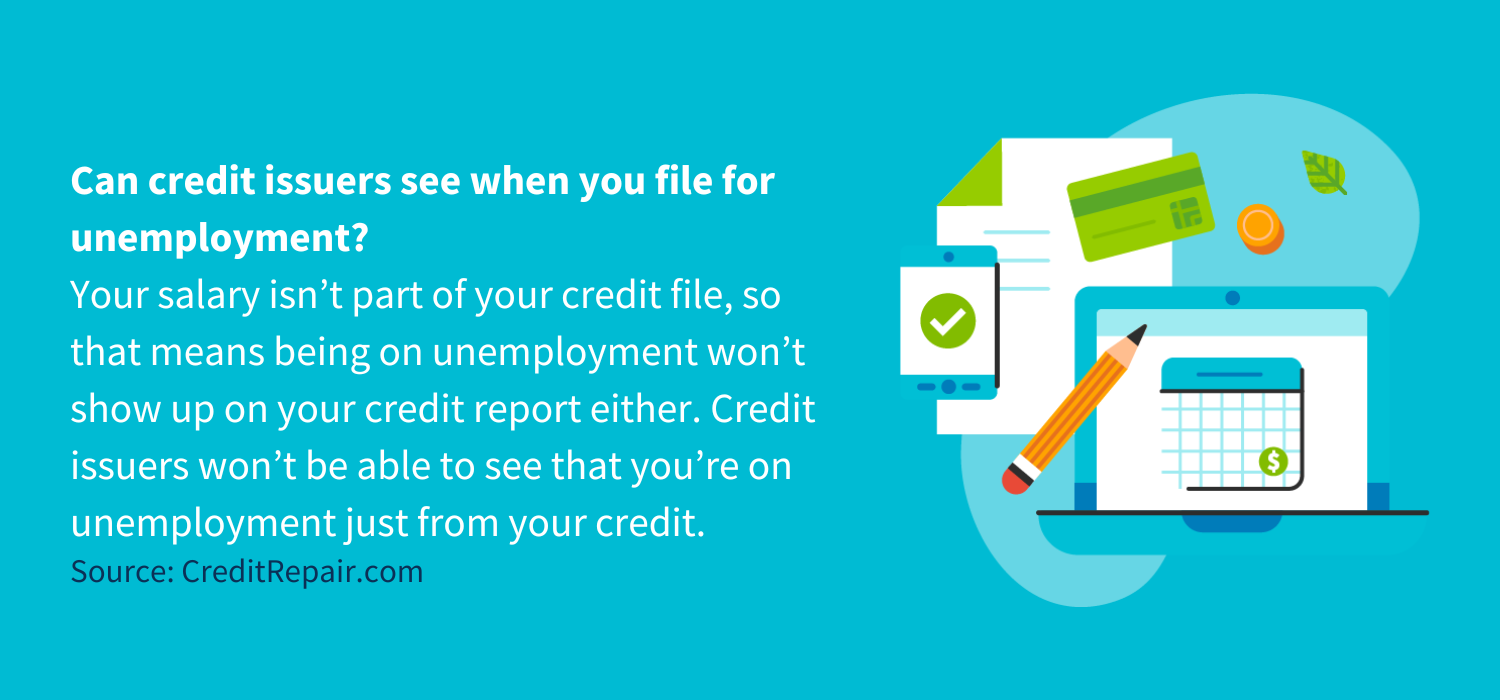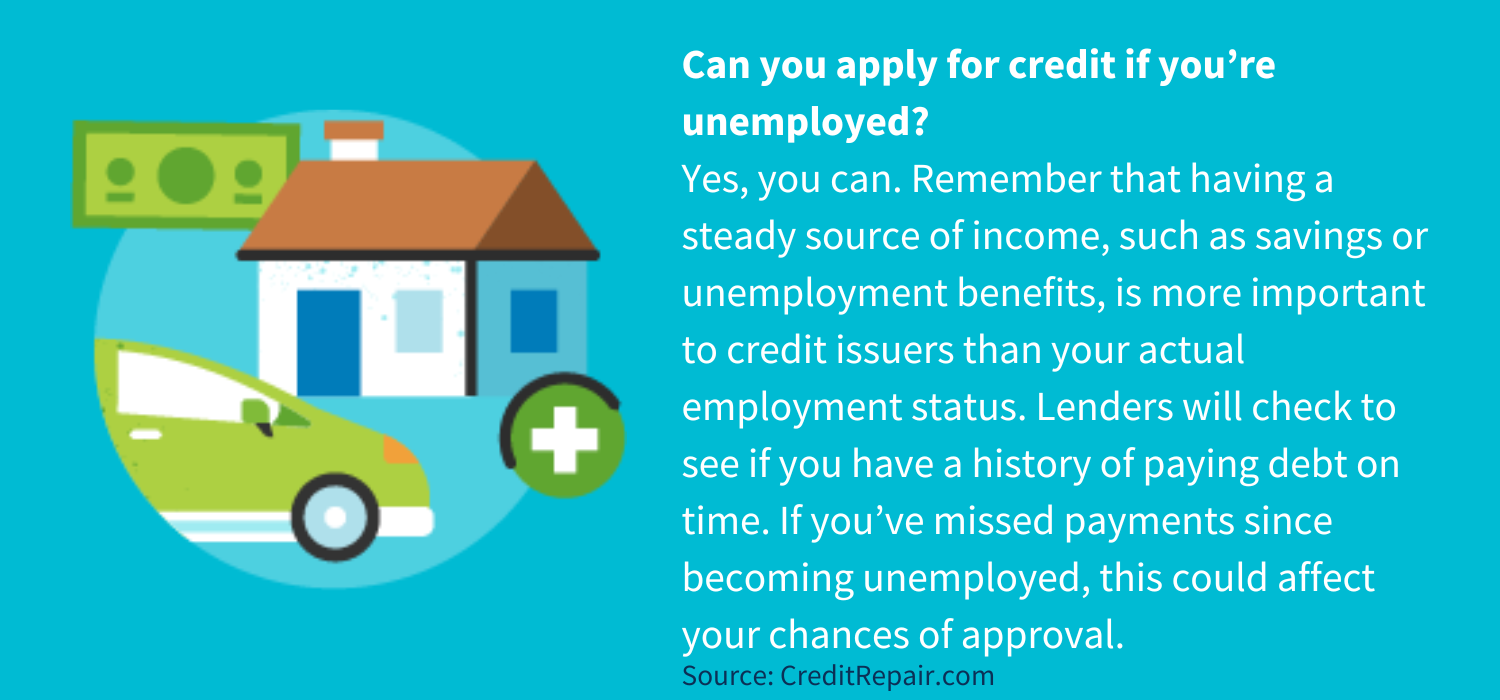
Disclosure regarding our editorial content standards.
While the national unemployment rate in the United States was 3.7 percent as of August 2022, just a year previous it was at 5.2 percent.
Unemployment rates do vary by state, but even if rates continue to trend down, it’s important to understand what impact unemployment can have on your finances.
Being on unemployment doesn’t directly affect your credit, but if it causes further economic hardship, it could have an effect on your credit down the line. Learn more about how unemployment and your credit interact and how to protect your finances if you find yourself facing a job loss.

Can credit issuers see when you file for unemployment?
First off, your salary isn’t part of your credit file, so that means being on unemployment won’t show up on your credit report either. Credit issuers won’t be able to see that you’re on unemployment just from your credit.
However, it’s common when someone is facing unemployment to also be dealing with missed payments and higher levels of credit card debt. These kinds of issues will show up on your credit report, have a negative impact on your credit score and be visible to any potential creditors.
What personal information does a credit report have?
Knowing what information a credit report contains can help reduce stress about how your unemployment status may affect your credit. Your credit report shows personal identification information, including:
- Legal name, as well as any former names
- Current and former addresses
- Social Security number
- Phone numbers
- Employers
Your account history, which includes all of the credit cards and loans you’ve had, will also be listed alongside balances, payment history, how long each account has been open and the current status. Past bankruptcies are available on your credit report, as well.
Do lenders and the credit bureaus know I’m unemployed?
Lenders and credit bureaus don’t know you’re unemployed unless you give them access to that information. But if your lender notices unusual behaviors, such as major spending increases or minimal payments, they may request a manual review of your account to see what’s happening.
How filing for unemployment can affect your credit
Because unemployment isn’t visible to creditors and isn’t factored in to your credit score, it doesn’t affect your credit directly. However, it can affect your credit indirectly if the period of unemployment causes other financial issues, such as the following.
Shrinking savings
While your bank balances aren’t reported on your credit, how much you have in your accounts can make a difference for some types of loans.
The less cash you have in the bank, the more of a risk the lender is taking on you, because it may not look like you have the money to be able to afford a payment.
In general, it’s a good idea to always have an emergency fund in a savings account or another account that you can access easily to cover things like unexpected expenses or unexpected reduced income, such as in the case of unemployment.
How much you need in your emergency fund varies by situation, but a good rule of thumb is to have three to six months’ worth of expenses saved up if possible. If you lose your job, this gives you some time to work on finding another job without having to worry about how you’re going to pay your bills.
Late or missed payments
Unemployment means reduced income because even if you’re able to qualify for unemployment payments, these usually aren’t close to what your normal income would be.
If there’s not a lot of wiggle room in your budget, this can mean you start missing payments on bills, credit cards and loans, all of which can affect your credit.
Your payment history has the biggest effect on your credit, making up a full 35 percent of your score, so even a few missed payments can seriously lower your credit score.
If you know you’re not going to be able to make your minimum payments because of unemployment, make sure to talk to your lender and creditors as soon as possible. You may be eligible for a reduced payment amount or something like a forbearance or deferment.
Higher credit utilization
If you’re not bringing in enough money to cover all your bills and living expenses, it can be tempting to start using credit cards to bridge the gap. If this is a temporary problem and you’re able to continue making your payments on time, it’s not the worst thing you can do, but it can affect your credit.
Your credit utilization makes up 30 percent of your credit score. In general, the more you owe, the lower your score. However, the rule of thumb is to keep your credit utilization under 30 percent. For example, if you have a credit card with a $10,000 limit, that would mean you would need to keep the balance under $3,000.
To avoid racking up credit card debt and hurting your score, work on cutting expenses as much as possible and taking advantage of other offers such as coupons and discounts. The less money you need every month, the less you’ll need to put on a credit card.
Disqualification from certain loans
Even if you’re able to maintain good credit during your period of unemployment, it can still affect your eligibility for certain types of credit products. Some loans, including car loans and mortgages, require proof of income before you can qualify.
This is because they consider your debt-to-income ratio—basically, how much debt you have compared to how much money you make—when deciding to approve you.
If you can’t show current and consistent income, you may not be able to get these types of loans, even if your credit history and score are otherwise stellar.

Can you apply for credit if you’re unemployed?
Yes, you can. Remember that having a steady source of income, such as savings or unemployment benefits, is more important to credit issuers than your actual employment status. Lenders will check to see if you have a history of paying debt on time. If you’ve missed payments since becoming unemployed, this could affect your chances of approval.
What to do if you can’t make your minimum payments
Ask your credit issuer if they offer financial assistance programs, such as deferment or forbearance. This can help you put off making payments while you try to get back on your feet. Some credit cards don’t charge late fees, which limits the accumulation of more debt.
Protect your credit when you’re unemployed
Losing your job can be scary, but it doesn’t have to turn your finances and credit upside down. A little bit of preparation in the form of an emergency fund can go a long way, but even if you’re hit with unemployment suddenly, taking steps to lower your expenses and stretch your money can help protect your credit.
It’s always a good idea to keep an eye on your credit report to watch for inaccurate items, even when you are unemployed. If you want help monitoring your credit or filing disputes, the credit advisors at CreditRepair.com are always happy to help.
Note: The information provided on CreditRepair.com does not, and is not intended to, act as legal, financial or credit advice; instead, it is for general informational purposes only.
Questions about credit repair?
Chat with an expert: 1-800-255-0263






